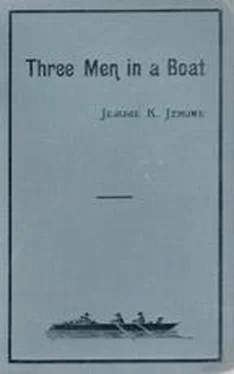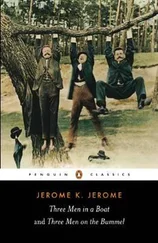«No, no,» we replied, with a knowing chuckle, «not we. WE don't mean to get wet — no, no.»
And when the afternoon was nearly gone, and still there was no sign of rain, we tried to cheer ourselves up with the idea that it would come down all at once, just as the people had started for home, and were out of the reach of any shelter, and that they would thus get more drenched than ever. But not a drop ever fell, and it finished a grand day, and a lovely night after it.
The next morning we would read that it was going to be a «warm, fine to set–fair day; much heat;» and we would dress ourselves in flimsy things, and go out, and, half–an–hour after we had started, it would commence to rain hard, and a bitterly cold wind would spring up, and both would keep on steadily for the whole day, and we would come home with colds and rheumatism all over us, and go to bed.
The weather is a thing that is beyond me altogether. I never can understand it. The barometer is useless: it is as misleading as the newspaper forecast.
There was one hanging up in a hotel at Oxford at which I was staying last spring, and, when I got there, it was pointing to «set fair.» It was simply pouring with rain outside, and had been all day; and I couldn't quite make matters out. I tapped the barometer, and it jumped up and pointed to «very dry.» The Boots stopped as he was passing, and said he expected it meant to–morrow. I fancied that maybe it was thinking of the week before last, but Boots said, No, he thought not.
I tapped it again the next morning, and it went up still higher, and the rain came down faster than ever. On Wednesday I went and hit it again, and the pointer went round towards «set fair,» «very dry,» and «much heat,» until it was stopped by the peg, and couldn't go any further. It tried its best, but the instrument was built so that it couldn't prophesy fine weather any harder than it did without breaking itself. It evidently wanted to go on, and prognosticate drought, and water famine, and sunstroke, and simooms, and such things, but the peg prevented it, and it had to be content with pointing to the mere commonplace «very dry.»
Meanwhile, the rain came down in a steady torrent, and the lower part of the town was under water, owing to the river having overflowed.
Boots said it was evident that we were going to have a prolonged spell of grand weather SOME TIME, and read out a poem which was printed over the top of the oracle, about
«Long foretold, long last;
Short notice, soon past.»
The fine weather never came that summer. I expect that machine must have been referring to the following spring.
Then there are those new style of barometers, the long straight ones. I never can make head or tail of those. There is one side for 10 a.m. yesterday, and one side for 10 a.m. to–day; but you can't always get there as early as ten, you know. It rises or falls for rain and fine, with much or less wind, and one end is «Nly» and the other «Ely» (what's Ely got to do with it?), and if you tap it, it doesn't tell you anything. And you've got to correct it to sea–level, and reduce it to Fahrenheit, and even then I don't know the answer.
But who wants to be foretold the weather? It is bad enough when it comes, without our having the misery of knowing about it beforehand. The prophet we like is the old man who, on the particularly gloomy–looking morning of some day when we particularly want it to be fine, looks round the horizon with a particularly knowing eye, and says: «Oh no, sir, I think it will clear up all right. It will break all right enough, sir.»
«Ah, he knows», we say, as we wish him good–morning, and start off; «wonderful how these old fellows can tell!»
And we feel an affection for that man which is not at all lessened by the circumstances of its NOT clearing up, but continuing to rain steadily all day.
«Ah, well,» we feel, «he did his best.»
For the man that prophesies us bad weather, on the contrary, we entertain only bitter and revengeful thoughts.
«Going to clear up, d'ye think?» we shout, cheerily, as we pass.
«Well, no, sir; I'm afraid it's settled down for the day,» he replies, shaking his head.
«Stupid old fool!» we mutter, «what's HE know about it?» And, if his portent proves correct, we come back feeling still more angry against him, and with a vague notion that, somehow or other, he has had something to do with it.
It was too bright and sunny on this especial morning for George's blood–curdling readings about «Bar. falling,» «atmospheric disturbance, passing in an oblique line over Southern Europe,» and «pressure increasing,» to very much upset us: and so, finding that he could not make us wretched, and was only wasting his time, he sneaked the cigarette that I had carefully rolled up for myself, and went.
Then Harris and I, having finished up the few things left on the table, carted out our luggage on to the doorstep, and waited for a cab.
There seemed a good deal of luggage, when we put it all together. There was the Gladstone and the small hand–bag, and the two hampers, and a large roll of rugs, and some four or five overcoats and macintoshes, and a few umbrellas, and then there was a melon by itself in a bag, because it was too bulky to go in anywhere, and a couple of pounds of grapes in another bag, and a Japanese paper umbrella, and a frying pan, which, being too long to pack, we had wrapped round with brown paper.
It did look a lot, and Harris and I began to feel rather ashamed of it, though why we should be, I can't see. No cab came by, but the street boys did, and got interested in the show, apparently, and stopped.
Biggs's boy was the first to come round. Biggs is our greengrocer, and his chief talent lies in securing the services of the most abandoned and unprincipled errand–boys that civilisation has as yet produced. If anything more than usually villainous in the boy–line crops up in our neighbourhood, we know that it is Biggs's latest. I was told that, at the time of the Great Coram Street murder, it was promptly concluded by our street that Biggs's boy (for that period) was at the bottom of it, and had he not been able, in reply to the severe cross–examination to which he was subjected by No. 19, when he called there for orders the morning after the crime (assisted by No. 21, who happened to be on the step at the time), to prove a complete ALIBI, it would have gone hard with him. I didn't know Biggs's boy at that time, but, from what I have seen of them since, I should not have attached much importance to that ALIBI myself.
Biggs's boy, as I have said, came round the corner. He was evidently in a great hurry when he first dawned upon the vision, but, on catching sight of Harris and me, and Montmorency, and the things, he eased up and stared. Harris and I frowned at him. This might have wounded a more sensitive nature, but Biggs's boys are not, as a rule, touchy. He came to a dead stop, a yard from our step, and, leaning up against the railings, and selecting a straw to chew, fixed us with his eye. He evidently meant to see this thing out.
In another moment, the grocer's boy passed on the opposite side of the street. Biggs's boy hailed him: «Hi! ground floor o' 42's a–moving.»
The grocer's boy came across, and took up a position on the other side of the step. Then the young gentleman from the boot–shop stopped, and joined Biggs's boy; while the empty–can superintendent from «The Blue Posts» took up an independent position on the curb.
«They ain't a–going to starve, are they? » said the gentleman from the boot–shop.
«Ah! you'd want to take a thing or two with YOU,» retorted «The Blue Posts,» «if you was a–going to cross the Atlantic in a small boat.»
«They ain't a–going to cross the Atlantic,» struck in Biggs's boy; «they're a–going to find Stanley.»
Читать дальше












